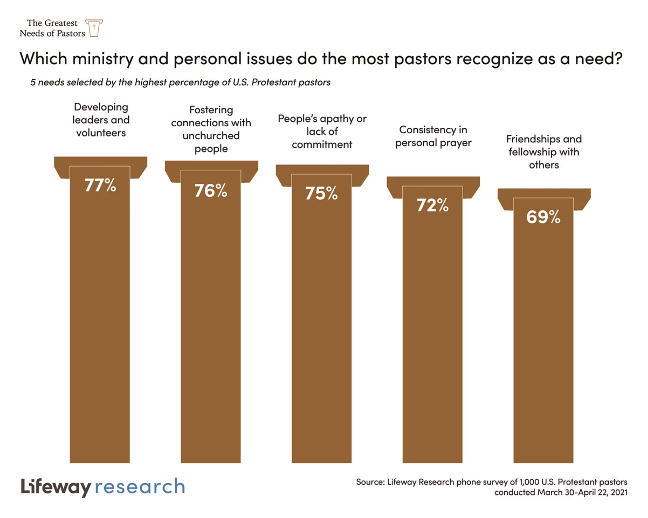

It’s easy to say we agree with the previous statement, but it’s harder to believe it. Many Christians start their workday and wonder if typing on a computer for the entire day is worth the trouble. Teachers struggle to see the value of the work they put into lesson plans, especially when their students do not listen. CEOs of Fortune 500 companies wonder if all the long hours in the office will fulfill their hopes and dreams. In every job sector, people love God but often do not know if God cares about their work.
Work can be challenging and stressful, but it does not have to feel meaningless. Since God cares about our work, we must look to him to understand why our work matters.
The first few pages of Scripture contain God’s perspective on creating the universe. One of the main topics that the first three chapters of Genesis address is work. In fact, over 60% of the verses in Genesis 1–3 say something about work. God labored for six days and then rested on the seventh. When God created humans, the first thing he told them to do was work (Genesis 1:26; 2:15).
Work has always been essential to God’s plan for the world and his people.
God also said all he created was good, which includes humanity and their work. But since the tragic introduction of sin into the world, recorded in Genesis 3, humanity has doubted the goodness of work.
Our labor had dignity before being distorted. So today, we need to see our work as a reflection of God’s goodness—the way God saw it in the beginning. We should not dread our nine to five or see it as a part of the Genesis 3 curse. When we do our jobs, we fulfill a part of our God-given purpose to create, cultivate, and care for the earth. God sees both the garbage truck driver and the astrophysicist and says their work is good.
Many may not know what a J bolt is, but there is a J bolt helping to secure the foundation of buildings all over the world. J bolts are small J-shaped pieces of metal used to secure concrete foundations and provide an anchor for building structures. They look small and insignificant, but they serve people in a major way every day.
Work is one of the J bolts of society. The jobs we do play an essential role in supporting and contributing to the economic and social foundations of our lives. Our work, like a J bolt, impacts people, even when our jobs might look or feel insignificant.
We can also see examples of how work serves people in the Bible. In Exodus 31:1–11, God chose people with specific skills to work with wood, metals, and cloth to provide the necessary tools for Israel’s daily worship. Because of their craftsmanship, God was glorified and God’s people had a place to worship God for generations.
The work we do plays a role in serving our world. Without it, many people would have unmet needs and miss out on the ways our job benefits society. We need godly businesspeople to ensure business transactions involve fairness and equality. We need plumbers to handle our sanitation issues before they become public health concerns. We need metalworkers to make J bolts so our buildings can stand firm. No matter what we do, our work matters because it serves others.
Christians can be tempted to think a vocation is only spiritual if it’s a ministry job. But being a pastor is not the only job that can impact the kingdom. The Great Commission from Matthew 28 tells us that God calls his people to go all over the world to share the good news of Jesus Christ. But if the church has any chance of reaching the world, pastors cannot be the only people who use their vocation as a platform for the gospel.
What better opportunity is there than going to work every day to share the Christian life with many who do not know Jesus? Colossians 4:3 encourages Christians to pray for “open doors” to spread the name of Christ. God can use us in our jobs to build his kingdom, whether we are a professional football player or a high school janitor.
When we look to God for why our work matters, we can see that our jobs have a God-given purpose. God created work and it is good. Our vocation can serve people and grow the kingdom of God. We can therefore approach our nine to five knowing that God cares about what we do and sees our work as significant—to him, his people, and the world.
Are you a business leader looking to invest in a personal care resource for your employees that can help them flourish in every area of life? RightNow Media @ Work, a library of on-demand video resources has a library of over 20,000 videos on topics from leadership and personal development to parenting and finances. Schedule a free demo today!
Writer
If you’re a decision-maker at your organization, request a free consultation to find out how RightNow Media can equip and inspire your people.
Not a decision-maker?
Tell your pastor about RightNow Media instead.


It’s no overstatement to say that we are more distracted now than we’ve ever been. The “chaos machine” in our pockets constantly diverts our attention away from what matters, gluing our eyes to the things that don’t. And with our attention goes our focus.
Addressing this very topic, New York Times bestselling author and speaker Jon Acuff recently filmed a new series with our team entitled Focus: In a World of Bottomless Distractions and Endless Opportunities. We caught up with Jon to hear what he learned while preparing this series and his hope for those who go through it.
Jon: One thing I learned is how distracted we all are. I like to say that our distraction technology has outpaced our ability to focus. Think about how fast distraction has scaled. I mean, twenty years ago the only distraction I had on my phone was a game called snake. I don’t know if you’re my age, but it just was a line that went “doot, doot, doot, doot, doot.” Now, you have every movie ever made, every book ever written, and every podcast ever recorded in your pocket. You have a chaos machine in your pocket. So, it was really interesting to learn—that’s part of why it’s challenging. You shouldn’t feel bad that it’s hard to focus; the odds are stacked against you because of our technology. But there are some really simple things you can do, and that’s what was so fun about filming this series.
Jon: I want viewers to walk away with the idea that you can learn how to focus. It’s not a personality trait. It’s not something that some people are good at and others are bad. When you talk to people about, “Is it easy for you to focus?” or “Do you ever get distracted?” sometimes they make identity statements. They say, “I’m a really distracted person. I can never focus,” as if they can’t learn. But the one thing I want you to walk away with is you can learn, and there’s some very practical things you can do that are actually really fun. And you get to see pretty quick progress. So I want you to walk away with the idea that you can do it and that there’s things you can do.
Jon: My most memorable moment of any series—we’ve done because we’ve done three together (so, I know I’m talking about Focus, but we’ve done Soundtracks and Finish)—my most memorable moment was where I got to the shoot and there was a cliff. They had set up the shoot on the edge of a cliff that was three-hundred feet high, overlooking a river, and there was a rock that was, in my opinion, very close to the edge of the cliff. And they said, “Hey, we just want you to stand on this rock, it’ll be an amazing shot.” And I said, “What’s your second idea?” Because I talk with my hands, I move around a lot, I’m very animated. So, I said, “There’s no way I’m getting on that rock.” So, if you watch that video, I’m perched on the rock. I’m sitting on the rock, that was our compromise, but I’m kind of looking over my shoulder. That was the most memorable. The second was, we filmed in Nissan Titan Stadium in Nashville, Tennessee, where I live. And it was an amazing shot, and they had a drone, and it was just gorgeous. So, I love partnering with RightNow because they always do such beautifully well-thought-out work.


If you’re feeling overwhelmed and underequipped as a church leader, you’re not alone. With the influence of social media, changing cultural dynamics, and the impact of the COVID-19 pandemic, today’s pastors face unique challenges. According to recent studies, today’s pastors are struggling with everything from time management to trusting God. Lifeway Research spoke with more than 1,000 pastors about their greatest needs; five were most commonly mentioned:

At RightNow Media, our core value is “The mission of the church matters.” We are here to pray for, equip, and encourage church leaders in their ministry because healthy leaders are crucial to building healthy churches.
As a busy pastor, it can be hard to find time to equip your leaders and volunteers. While digital training can’t replace in-person experiences, it is an effective tool to develop your leaders outside of face-to-face trainings. RightNow Media has a library full of Interactive Training Content you can assign to your leaders to complete when it's convenient for them. Or, click here to learn how you can create your own Interactive Content.
The following blog post will help you learn about some of the fears and doubts your leaders and volunteers may be experiencing. You can share this article with your team to encourage them!
Jesus clearly calls us to “go and make disciples of all nations” (Matthew 28:19–20). But outreach ministry can take a backseat when we feel too busy with what’s going on inside the walls of our church.
Even if you don’t have a designated external outreach ministry, you can still foster connections with unchurched people. Read this blog post for practical ways you can begin to bridge the gap between your congregation and the unchurched.
We all want our churches to thrive, but many of our congregations struggle with attendance, recruiting volunteers, and keeping members engaged. There may be moments when you feel like one of the only people committed to the mission of your church. But no matter how you feel, God’s promises are true and he promises to never leave you or abandon you (Deuteronomy 31:6).
Read this blog post for an encouraging word on staying committed to the church even when you sense apathy in your congregation.
With the many responsibilities of shepherding others, pastors can unintentionally put their personal relationship with God on the backburner. In our desire to be self-sufficient, we often forget that we have a Father who hears our prayers and loves when we talk to him.
Reignite your passion for prayer with this practical blog post all about the gift of talking with your heavenly Father.
While church leaders often preach the need for Christian community, the perceived safety and comfort of isolation can tempt tired pastors. While it can be difficult to find people who understand the unique weight of spiritual leadership, community is worth pursuing for pastors in every stage of their ministry.
Set aside a few moments for self-reflection and to answer the questions in this blog post written specifically to pastors. Then, consider the opportunities in your life to connect with other church leaders.
It’s a challenging time to be a pastor, but current circumstances don’t nullify God’s promises. Listen to what God says through the prophet Isaiah:
Do not fear, for I have redeemed you; I have called you by your name; you are mine. When you pass through the waters, I will be with you, and the rivers will not overwhelm you. When you walk through the fire, you will not be scorched, and the flame will not burn you. (Isaiah 43:1–2)
No matter what difficulties you face as a church leader, God’s love for you is unwavering. His plans for you are good. His divine power has given you everything you need for a godly life (2 Peter 1:3).


So, you’re about to lead a small group, maybe for the first time, and you’re sure your pastor made a mistake in asking you to lead this group. You may be feeling overwhelmed, inadequate, and a little anxious at the thought of someone asking a question you don’t know the answer to. How can you, a normal person, lead a small group?
For some reason, we often think Bible study leaders have to be the smartest person in the room, armed with quick, charming, and compelling answers for every question. Good leaders host their small group in a pristine home or know the coolest place in town to chat over coffee. They’re stylish, funny, brilliant, put-together, and BFFs with Jesus. Now, we know small group leaders aren’t all of those things but—for whatever reason—we are sure we have to be that kind of leader.
The truth is you don’t have to be perfect in order to be effective. You don’t even need to be perfect in order to be a great small group leader. The best small group leaders are actually far from perfect, but they do share some traits in common that you can easily add to your own life.
Take a second to answer this question: What makes small group leaders different than the people they are leading?
Many of us think leaders are gurus—perfect, all-knowing, wise ones who know the Bible inside and out and can answer any question. But gurus make really bad small group leaders. They tend to make group meetings all about themselves, their knowledge, and their insights. It’s pretty hard to focus on Jesus when the leader is making the group about themselves.
The most effective small group leaders are guides. They have a map, know what trail they are on, and know where they are headed. Their leadership is not about getting everyone to focus on them but on avoiding dangers and making progress towards their destination.
Your small group time is not about you; it’s about Jesus. Your responsibility is to keep people focused on him, becoming more like him, and making him known.
But what if you don’t have the answer to a tough question? A guru would be threatened because it would challenge their status as the all-knowing leader. But a guide? Guides aren’t threatened because they have the “maps” of God’s Word, the support of church staff, and an abundance of great resources for answering tough questions at their fingertips. Guides actually become more helpful when tough questions come up.
If you don’t know an answer, be honest: “I don’t know, but I will try to find an answer for our meeting next week.” Which brings us to the second quality of effective leaders.
It’s like legendary basketball coach John Wooden said,
“Failing to prepare is preparing to fail.”
Being prepared doesn’t mean you have to outline your meeting minute by minute, but you should know what you are going to cover in your group that week. Take time to look over the Bible verses, study questions, and any resources you will be using. Preparation will look different for everyone, so find a method that works best for you.
The most effective small groups aren’t thrown together last second; they are the result of a prepared leader prayerfully thinking through the time they are about to spend in God’s Word. After all, if you are a guide, you need to know your map!
But being prepared does not mean you have to teach your group because…
You don’t have to be a seminary professor or pastor to be a great group leader. You simply need to facilitate conversation. Think of your group as a community rather than a classroom. Your goal in the group is to help the church grow in spirit and in truth, not ace a Bible quiz.
Ask an opening question and wait for people to start talking (it’s okay to endure a little awkwardness). If your group starts running down a rabbit trail, gently point them back to the topic at hand. Ask open-ended questions. Try to get everyone involved in the conversation. At the end of your time, talk about ways to apply what you are learning.
More often than not, you will learn from the people in your group. They will see things you missed. They will have ideas you wished you’d thought of. But for a great small group leader, being a part of a community headed towards Jesus isn’t about being in front—it’s about leading people to Jesus.
Starting out as a small group leader can be daunting. But most of our anxiety comes from thinking we have to be spiritual gurus. Once we realize that we are guides, the anxiety to be perfect starts to slip away. When we prepare well, we will build our confidence. Shifting our role from “teacher” to “member of the community” will take away our self-imposed performance pressure.
Great group leaders are normal people, just like you. No matter your background or leadership experience, if you guide people to Jesus you’ll be doing exactly what you’re supposed to do.


But despite our best intentions to engage with God every day, many of us struggle to do so. According to The American Bible Society, 181 million Americans opened a Bible in 2021. Of those 181 million people . . .
If you have struggles, doubts, or fears when it comes to engaging with God’s Word, you are not alone. Millions of Christians desire to spend more time with God, but don’t know how.
So, how can we spend daily time with God when obstacles get in our way? To answer that question, we’ll start by digging into what God’s Word says about spending time with him.
Spending time with God isn’t just something we should do for him—it’s something he wants to do with us. We serve a personal, caring God who invites us to come to him for rest (Matthew 11:28–30).
If we approach God with a humble heart, we have freedom in the details of how we engage with him. James 4:8 says, “Draw near to God, and he will draw near to you. Cleanse your hands, sinners, and purify your hearts, you double-minded.” God cares more about our heart posture than our method of relating to him.
Starting a new habit is overwhelming when we try to do it on our own. However, when we depend on God for help, we are empowered to change by the power of the Holy Spirit. Romans 12:1–2 encourages Christians to surrender to God’s renewing sanctification that will help us look more like him. We don’t need self-help; we need to depend on God for true transformation.
Let’s get practical about how we can spend time with God regularly in 2022. There will be some reflection prompts in the following section, so make sure you have somewhere to record your answers.
There’s a big difference between saying to yourself, “I’ll spend time with God at some point,” and “I will spend thirty minutes with God at [time] and [place].” The clearer your plan, the more likely you are to make it happen. Take a moment to write down your plan.
Proverbs 15:22 states, “Plans fail when there is no counsel, but with many advisors they succeed.” One of the best tools we have for habit change is the accountability and support of one another. If you want to spend more time with God, it will be helpful to tell trusted friends so they can keep you accountable. Brainstorm a list of possible accountability partners and plan how you will stay accountable to them.
Think of the things you do every single day and ponder how you could integrate God’s Word into those pre-existing routines. For example, if you usually watch TV before bed, try putting your Bible on your bedside table and reading before you go to sleep. If you’re in the habit of listening to the news on your morning commute, try listening to worship music or a sermon. The options are endless. List three things you do every single day and brainstorm ways to invite Jesus into those routines.
Spending time with God doesn’t have to be a chore. You don’t have to do the same thing every day. Remember, God cares more about our heart posture than our method of relating to him. You can switch up your routine by listening to a Christian podcast or watching a Bible study video. RightNow Media has a vast library of biblical videos you can use as a starting point for your devotional time. These videos can help you better understand Scripture, live by biblical values, and learn to share your faith with others.
You can also browse our Men’s, Women’s, Youth, and Kids libraries to discover video content for everyone.
It takes time for habits to form and change, and the journey won’t be perfect. Instead of getting discouraged by your struggles and slip-ups, use them as opportunities to grow closer to God. Remember, he wants to spend time with you. Whether you’re reading the Bible, watching a RightNow Media video, or journaling your prayers to God, each interaction with him will sanctify you to think, act, and love more like Jesus.


Since Jesus left the disciples, we have carried the gospel across the globe. But, when we think of how to connect with unchurched people in our community, we can be left scratching our heads.
Was it always this hard? Do we need to make our churches more relevant, more trendy, more comfortable? We feel like we’re doing all the right things but we aren’t seeing results—what are we missing?
It can be disheartening to go through seasons where we aren’t seeing people come to Christ. We can feel stuck or behind. It can be tempting to think that we have to try something drastic to introduce more people to Jesus. But when we think about reaching the unchurched—people who have no experience with or interest in either the church or Christ—we don’t need to reinvent the wheel. We simply need to do what Christians have always done with a strategy that best fits our context.
In Bible study, we all know context is king. If you don’t know the context of a passage, you will probably miss the point. The same holds true for your church. God has placed you (a unique pastor) in your church (a unique people) in a unique place. Your position is purposeful and should define everything from the sermons you preach to the sort of programs your church offers.
To connect with the unchurched, start by thinking through your unique context—the things that make your mission field and position unique. These questions can get you started:
No matter how you answer these questions, starting with God’s unique design for your church will give you an idea of his direction for your church. For example, if non-Christians in your community are unlikely to go to church on Sunday, think about how you can empower your people to befriend their neighbors or to make your small groups open to visitors. Or, if your church is downtown but speaks the language of the suburbs, consider how you might adapt to relate to the people next door.
As you figure out your context, your creativity will spark. You will think of new events, sermon series, or ministries that could help you connect with the unchurched. But, as our culture changes, our posture also needs to adjust. For decades, the church has operated on a “come and see” model. People were willing to go to church or check out weekly ministries because the church was broadly seen as trustworthy and needed. Today, that is not always the case.
Unlike in year’s past, people today are more likely to think organized religion isn’t important. According to a 2019 Gallup study, only 36% of Americans have a high level of confidence in the church or organized religion, an all-time low. At the same time, 29% of Americans have little or no confidence in the church, an all-time high. In other words, we should assume that the people around us are skeptical of the church, even if they claim Christ.
So what do we do? A Sunday service may attract a handful of curious unchurched people. But a mobilized congregation of purposeful, Christlike friends can reach dozens of neighborhoods, workplaces, coffee shops, and grocery stores every day. Our congregations can reach more unchurched people in a day than we could with dozens of well-crafted sermons.
The attractional model has passed its prime. It is useful in some areas, but less so every year. To connect with the unchurched, our model for ministry needs to turn outward, shifting from a “come and see” to a “go and tell” mentality. For some of us, we may just need a change in our language, speaking to the specific concerns and questions of our culture. For others, we may need to fundamentally alter the way we do ministry.
There are many reasons why the unchurched may not be attracted to a church service or event, but there is nothing stopping us from going to them. Everywhere you go, someone needs Jesus: your neighbors, coworkers, bank tellers, and mail carriers. God has placed you in their path; trust him and what he can do in their lives.
Connecting with the unchurched is not about marketing strategies, trendier social media accounts, or more relevant sermon illustrations. None of those things redeem sinners. Only God can change a person’s heart. Our responsibility is to faithfully make disciples wherever and whenever God gives us the chance.
To summarize the Great Commission: go, baptize, teach.


Have you ever found yourself leaving a Sunday worship service saying to yourself, “The worship was great—I can’t wait for next week”? Or maybe you've had the opposite reaction: “I love this church, but the worship was not my favorite . . .” No matter which situation you have found yourself in, we can all admit that we sometimes equate worship with the music we sing on a Sunday morning.
Our perspective of worship is often limited to what we experience at church. But Scripture is clear about what worship is—it extends much deeper than the songs that we sing. Worship is an intimate expression of gratitude for the mercies of God that he’s given to his people. And singing is just one aspect of how we worship. True worship happens when we live a life of sacrifice—when we worship as a lifestyle.
Paul had a strong grasp of what it meant to worship when he wrote to the Roman church. In Romans 12 Paul writes,
“Therefore, brothers and sisters, in view of the mercies of God, I urge you to present your bodies as a living sacrifice, holy and pleasing to God; this is your true worship.”
Paul appealed to the church in Rome with the truth that worship is meant to be a sacrificial offering to God. What do we sacrifice? We sacrifice our lives to God. Sacrificing time by setting aside moments to reach out to those we care about is an expression of worship. Worship is sacrificing our money by giving consistently to the local church or covering a friend’s bill. It’s also offering our gifts and talents to help others. We’re called to live a lifestyle of worship—not setting apart portions of our week for worship but instead living in a constant state of worship knowing that every moment can be an act of service to God.
So, what does it look like to worship with our lives?
First, we worship in Spirit and in truth. In John 4:23, Jesus spoke with a Samaritan woman who would become the first evangelist of Jesus’s ministry. In this passage, John records Jesus’s words as he taught the woman how we worship. Jesus said,
“But an hour is coming, and is now here, when the true worshipers will worship the Father in Spirit and in truth. Yes, the Father wants such people to worship him. God is spirit, and those who worship him must worship in Spirit and in truth.”
Worshiping in Spirit and truth means we are led by the Spirit and grounded in the truth of Scripture. We need the Spirit—he moves in us, teaching us to worship, maturing us, and rooting us in truth. Sacrificial worship begins with our relationship with the Spirit. But how, exactly, does he help us to worship? In Romans 12:2, Paul says,
“Do not be conformed to this age, but be transformed by the renewing of your mind . . .”
Worship begins with internal transformation. Renewal of the mind does not come from self-improvement or the next great self-help podcast. The Holy Spirit is the one who changes us. By his power, we experience transformation in our minds, our desires, and our actions. We worship in Spirit and truth by surrendering to the Holy Spirit and allowing him to work in our hearts. When we do so, we allow him to change us, enabling us to offer ourselves completely to God.
Second, our worship is to be holy, or set apart. Paul is not calling us to worship perfectly but rather to offer holistic worship. As Jesus’s followers, how we serve, how we give, how we love—they’re all expressions of our worship.
We can often get distracted by the ways of the world and lose sight of where we orient our worship. One example is how our minds are often slaves to any form of stimulation or entertainment. We can spend countless hours streaming Netflix or scrolling through our smartphones and, before we know it, we’ve devoted half our day to mindless consumption. But Paul reminds us that in our worship we should “not be conformed to this age.” Our devotion to God should be all-encompassing, which means we cannot let sin run rampant in our lives. Instead, we should live in a way that shows our lives belong to God.
Finally, our worship is to be pleasing to God. He wants us to offer our joys, struggles, successes, and hardships to him. We please him as we move away from self-centeredness toward God-centered lives. As we do so, we begin to see that his ways are much greater than ours. Our desires and aspirations begin to align with his. Paul comments on this transformation in Romans 12:2 by saying,
“. . . so that you may discern what is the good, pleasing, and perfect will of God.”
Paul says when we have a lifestyle of worship, we align with the Holy Spirit, and we know and delight in the will of God. Worship connects us to our creator; it changes us and makes us more like Christ.
So, how do we worship as a lifestyle? We live a life of sacrifice. We devote every day to God. We worship in Spirit and in truth in a manner that is holy and pleasing to God. The music we sing moves us and allows us to express praise in a unique and creative way. But music isn’t the main avenue of worship—our lives are the ultimate vehicle of worship to our savior. How do you worship? How are you devoting your life in surrender to God?
Living out our worship begins with a biblical understanding of worship. Gather your family and tune into Worship in the Word. Sing along with Christian artists Shane & Shane as they share ten beautiful, simple songs drawn directly from Scripture, providing a biblical and captivating worship experience.


As we unpack our nativity scenes from eleven months of storage, placing Mary next to the manger is as normal as singing Christmas carols or watching Buddy the Elf eat gum off the subway railing.
For many of us, though, Mary never leaves the manger’s side. She goes back in storage with the wise men and reappears next year. While Mary serves the miraculous and cosmic role of birthing the Messiah, she is also a faithful witness of what it looks like to model Christ’s action of mediating between God and humanity—telling others what God is like and bringing him their concerns.
You may be thinking, “Wait, isn’t Jesus the only one who mediates between God and humanity?” And that instinct would be right. I’m not talking about mediating salvation between God and people—that’s something that only Jesus in his life, death, and resurrection has accomplished. What I am saying is that, like the prophets in the Old Testament standing as a go-between by proclaiming God’s message to the people and representing the people’s requests to God, Mary shows us how to occupy the space between God and the world as a light that points people to God.
Before traveling to Bethlehem for Jesus’s birth, Mary visited her cousin, Elizabeth, who was also miraculously pregnant. Elizabeth recognized Mary’s unique role as the “mother of [her] Lord” (Luke 1:43) and pointed toward Mary’s faith that God would “fulfill what he has spoken to her” (Luke 1:45).
In response, Mary launched into her famous speech magnifying God’s character—the Magnificat. These ten verses are more than Mary simply responding to her situation with gratitude. Mary shares God’s words not only with Elizabeth but also with us as readers thousands of years later.
Many commentators say Mary’s speech falls in the genre of prophecy. In essence, a prophet served as a mediator between God and people to provide the people with revelation of who God is. Mary comments on her own “humble condition” (Luke 1:48) and how God exalts the “lowly” (Luke 1:52), like herself. By describing herself in these terms, Mary speaks to those who may similarly feel overlooked or unimportant—much like how the people of Israel likely felt at the time of Jesus’s birth. Mary says that God has “helped his servant Israel, remembering his mercy to Abraham and his descendants forever” (Luke 1:54–55) with Jesus’s birth announcement, reminding God’s people that he cares and acts on their behalf.
Through her speech, Mary stepped into the space between God and his people by proclaiming the good news that God’s “mercy is from generation to generation” (Luke 1:50) and that “he has scattered the proud . . . [and] toppled the mighty from their thrones” (Luke 1:51–52). She reminds us that God “has satisfied the hungry with good things and sent the rich away empty” (Luke 1:53). Her song reads like many of the psalms in the Old Testament that proclaim the character of God to people in desperate need.
Mary models how we should be little mediators of God’s presence on earth—declaring his good news to people who need to hear it.
The beginning of Jesus’s public ministry provides a stage for Mary to stand as a type of mediator outside of the Christmas story. Before Jesus began teaching and demonstrating his identity as Israel’s Messiah, he and his disciples were invited to a wedding Mary also attended. As John writes in John 2:1–12, the wine for the wedding in Cana ran out and presented the host family with a problem.
Running out of wine at a celebration in Ancient Near Eastern culture was a social faux pas that would have brought enormous shame on the host family. Seeing this risk and interceding on behalf of the wedding party, Mary went to Jesus with a request without a question, “They don’t have any wine” (John 2:3).
Not only did Mary initiate stepping in as an in-between for the wedding party, but she also went straight to the person she knew could act, revealing her faith. She saw a need and entrusted it to the person who could meet that need.
While Jesus’s response appears harsh (his calling Mary “woman” isn’t derogatory or dismissive as he uses the same word when speaking tenderly to her on the cross in John 19:26), Jesus explained that he was hesitant because he had not begun to reveal his identity as Messiah—which Mary presumably knew—to everyone.
Instead of feeling rejected, Mary reaffirmed her faith in her son by telling the servants to do whatever Jesus told them to do. Jesus may have chosen not to act and told the servants to stand by, but Mary accepted that possibility and left the decision in Jesus’s capable hands. In doing so, she communicated an important truth not only for the servants at the wedding but also for us reading the passage today—obey God regardless of what he calls you to do. Mary advocated for people who had nowhere else to go and instructed them on how they should respond to God’s command—much like how the church operates in the world today.
Maybe it is appropriate that we think of Mary most often during the Christmas season. Christmas often calls us to act in mediatory ways.
This may be someone’s first Christmas alone, and they need to hear from you that God sees them. Perhaps this Christmas someone received bad news and needs you to advocate for them on your knees in prayer. By imitating Mary as she imitates Christ, we can be God’s ambassadors, channeling his overpowering love for them.


I’d spent my whole life in stage-of-life groups with people like me—guys with similar interests and struggles. Those groups made connecting with other Christians easy, but this new group was a challenge. I felt I had little in common with the retired empty-nesters and college students in my living room. I struggled to ignore the chaos of the toddlers playing on the floor. And I had no clue how to counsel married couples.
The people in my small group watched movies I’d never heard of, inhabited various corners of social media, held opposing political views, and even had different ideas on how to live the Christian life. How was I going to lead this group, much less help them build friendships with each other across their diversity?
I was facing the big challenge of multigenerational groups: connection. Because we gravitate to people like us, diversity can feel uncomfortable. But if we stick with the tension of getting outside of our bubble, we can find the richness of the body of Christ in all of our unique gifts, experiences, and wisdom.
Every group is different, and leaders can try many strategies to help their group form good, lasting relationships. But, as the leader, you need a strategy to help people overcome feeling disconnected from other group members.
Leading a healthy small group is like gardening: we can prepare the soil and water the seeds but only God can make the seeds sprout and grow. You can’t force friendships, but you can create a place for them to grow.
Think about the times you have felt most welcome in someone else’s home—what did they do that made you feel comfortable and appreciated? You don’t have to throw a dinner party; sometimes people just need to be asked about their day. Find the person standing on their own and strike up a conversation with him or her. Or if there is a young mother in your group, think about setting aside a space for her infant to sleep or nurse. A little consideration can make everyone who visits your group to feel valued.
The people in your group have a wealth of experiences and wisdom—far beyond what you as a leader have on your own. Instead of worrying about what you need to teach, think about the questions you can ask the people in your group. What do you want to know about them? What insights do they have that would bless the rest of your group? What have they learned about God and his faithfulness
If you have a hard time thinking of good questions, that’s okay! Most RightNow Media Original series come with free study guides full of great questions so that you can worry less about preparing lessons and focus more on the people in your group.
Everyone is busy, and it can feel like a struggle to make it to small group every week. But if you want your members to share their lives with each other, you will need to spend time together outside of your small group meeting. Don’t make it too complicated—you could get coffee with one person in your group each week or coordinate group lunch after church on Sunday. The more casual interactions you have with people in your group, the faster you will build meaningful relationships with them.
Every church has different goals for their small groups, but we all share the same mission: to make disciples and build God’s kingdom on earth. And nothing brings a group together like working as a team. Talk to your group about the causes and groups of people God has called them to serve. What need can your group meet? If your group has little kids, consider partnering with a local non-profit that can be flexible in the way you serve and are open to family friendly projects. Or find a place to serve as a group in your local church—if you get stuck, ask your pastor or other group leaders for ideas.
No one wants the relationships in their group to remain shallow. Getting together week after week to talk about news, sports, or the weather is, quite frankly, boring. We want our groups to be hubs of deep community marked by friendships, support, guidance, prayer, and evangelism. But meaningful friendships don’t happen overnight. It can take months (or longer) for a group to feel like a community. Don’t get discouraged when relationships don’t progress as quickly as you would like. In time, God will weave people together in ways you had not imagined. Don’t give up.
The first few months of your small group will be the most challenging as people push through awkwardness and build friendships with one another. In my group, some of the most unexpected people—people who did not immediately click with one another—ended up best friends and were in each other’s weddings. They’ve built families alongside one another, leaning on each other’s wisdom and support.


Developing collegial relationships with coworkers and excelling in our work requires us to build habits—regular practices that govern our everyday behavior and which influence our potential to meet our objectives.
We all already have workplace habits. Some of us walk into the office every morning with a cup of coffee in hand, fueled for the day. Some of us work more isolated, with our headphones on, while others keep a more open posture to interruptions. There’s also the regular, mid-morning break we take at the same time every day to say hello to colleagues down the hall.
Not all habits, of course, prove helpful. Mid-afternoon gossip sessions erode relational trust, as will complaining without seeking solutions.
In his book Habits, author and speaker Marcus Goodloe highlights three relational habits that will bring us more fulfillment in our work. The better coworkers we become, the sooner we can improve our work lives and relationships for the better.
I was eleven years old when I first decided to follow Jesus. One of the first changes I made after becoming a Christian was deciding to believe the best about people until proven otherwise. The toughest test for my resolution was the little third-grade neighbor boy who tormented me at the bus stop. I walked to the bus stop reminding myself to not expect him to annoy me. Maybe he would, but I would begin the day by giving him the benefit of the doubt. When we expect people to disappoint us or react negatively, we set them up for failure and ourselves for frustration. We’ve judged them based on their past, or on our assumptions, neither of which encourages a positive interaction in the present.
As the year progressed, he didn’t bother me as much. Was he the one who changed, or did I? Very possibly, my new attitude somehow communicated itself to him, and we both changed for the better. My husband, a public school administrator who constantly interacts with parents, teachers, and other school employees, calls it “positive presupposition.” When we enter an encounter at work assuming the best, we offer the other person an open mind, a measure of trust, and dignity. If we can put our biases behind us and interact with others from a clean slate, we honor them.
Will some people disappoint us? Of course. But we will know that we gave them a fair shake. And don’t we all appreciate it when others approach us with positive presupposition? When we get into the habit of assuming the best, our work relationships will become healthier and more effective.
One of the reasons we are to assume the best in others is that every person is made in the image of God. Everyone is sacred, or holy. The dignity inherent in each individual demands that we treat them with the respect and honor we all deserve.
Think about what makes you feel valued. Do you appreciate having people make eye contact with you when you are speaking with them? What does it do to you inside when you realize someone is actually listening as you share your concerns, ideas, or dreams? How do you feel when your supervisor asks about your family, remembers a significant day in your life, or assigns you a project that lines up with your passion? Small gestures carry a big weight because they tell us that we are seen and matter.
If you’ve ever played sports, you know the power of teamwork. Each player performs his or her role while depending on teammates to do theirs. Only together do they have a chance of winning. Even athletes in solitary sports like tennis or swimming will admit they cannot win without their coaches, trainers, family, and fellow athletes. We cannot succeed alone. Working in community is an exercise in humility, as we admit we lack certain abilities or talents. But that humility leads to thriving.
We think more creatively, more expansively, and more honestly when we are bouncing ideas off other people. We need each other for inspiration, support, and fine-tuning.
Let’s get in the habit of consulting others, encouraging colleagues, and creating a team that can rely on one another.
The essence of a workplace is the people, not the product. The better we treat one another, the more fulfilling we’ll find our work and the more excellent our work will become. When we assume the best, relate to each other with dignity, and actively seek to work in community, we will make our workplace a place to flourish.
To learn more habits that will improve your work experience and lead you to greater success, check out Marcus Goodloe’s new RightNow Media @ Work series, “Habits.”


According to the National Institute of Mental Health, about 1 in 5 adults are currently experiencing a mental illness—complicated issues involving mental, physical, chemical, emotional, and spiritual components. It’s safe to assume there are people in your family, at your workplace, and in your church who are currently struggling with mental health. Unfortunately, many stigmas exist around mental health in the church and in the world.
But here’s the good news: God cares about your mental health. In honor of Mental Health Awareness Month, we’re going to break down misconceptions about mental illness and highlight the freedom that comes through knowing Jesus.
Not everyone has a diagnosed mental illness, but everyone has mental health they need to protect. While about 20% of adults experience life with diagnosed mental illnesses, everyone goes through situations and setbacks that influence their mental wellbeing. A stressful work environment, the death of a loved one, a change in your relationships, or a traumatic experience are just a few examples of common mental health triggers.
Even if you’re in the 80% of people living without a diagnosed mental illness, you can still be part of the conversation. While not everyone talks about it, mental health is a relevant issue for all people.
Because of the recent increase in mass media conversations about mental health, it may seem like mental illness is a new issue. But the modern conversation is only catching up to what’s always been true: mental illness is a real struggle for many people.
Take King David, for example—most of his psalms are emotional cries to God in deep pain or true joy. If you’ve ever felt depressed, you’re not alone. Listen to what David writes in Psalm 6:
“I am weary from my groaning;
with my tears I dampen my bed
and drench my couch every night.
My eyes are swollen from grief;
they grow old because of all my enemies.”
In addition to David, Elijah and Job also faced mental health struggles. Elijah’s mental health suffered during his conflict with Jezebel to the point of Elijah wanting to die (1 Kings 19:3–4). Job felt depressed and fearful in response to his pain and loss (Job 3:24–26). If you’ve ever been emotional because of a broken relationship or situation in your life, you’re in good company. The Bible is a story of imperfect, mentally unhealthy people pursuing a perfect God who can restore hope in even the darkest moments.
The Bible explains Jesus as being without sin, but not without temptation, trials, or emotions. Jesus was fully God and fully human. He can relate to you.
Hebrews 4:15–16 puts it this way:
"For we do not have a high priest who is unable to sympathize with our weaknesses, but one who has been tempted in every way as we are, yet without sin. Therefore, let us approach the throne of grace with boldness, so that we may receive mercy and find grace to help us in time of need.”
The Bible shares countless stories of Jesus experiencing a vast spectrum of emotions. In his time on earth, Jesus was “tempted in every way as we are” so that he would be able to “sympathize with our weaknesses.” There is no feeling, situation, or mental illness that disqualifies you from Jesus’s understanding presence.
If you are currently struggling with mental illness, you are not alone. You are loved, seen, and cared for by God. Please reach out to a trusted doctor or spiritual leader for insight and advice. There is hope and healing for you.
If you are not struggling with mental illness, there’s probably someone in your life who is. Your kindness and compassion toward those who are struggling helps more than you realize. Your grace and empathy could be the answer to someone else’s prayer.
Wherever you’re at on your mental health journey, God is right there beside you. The fight for mental health is difficult, but you are never fighting alone.



